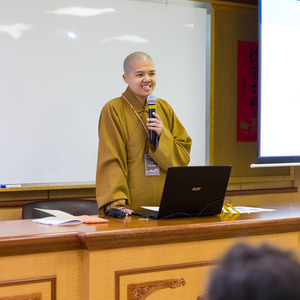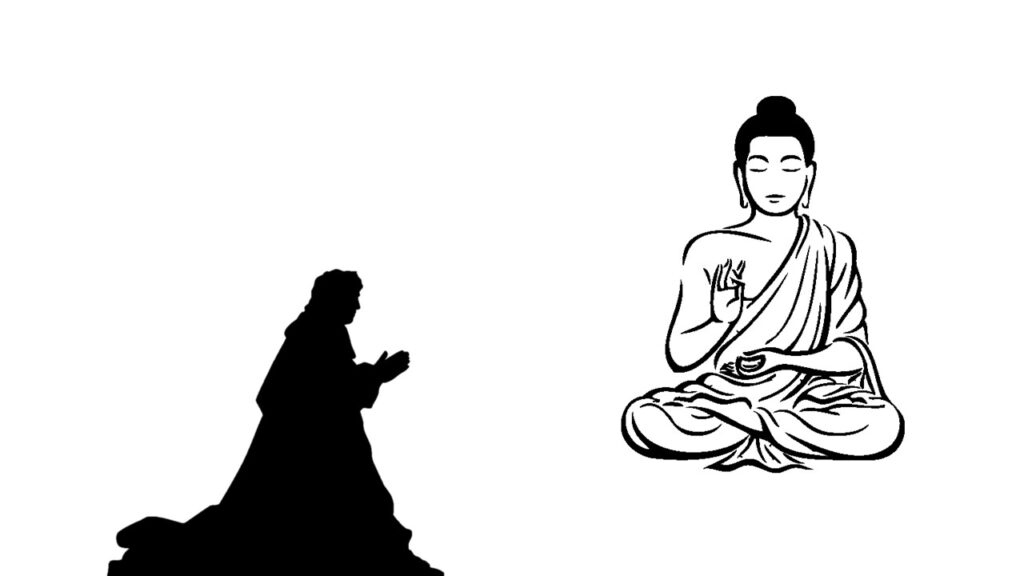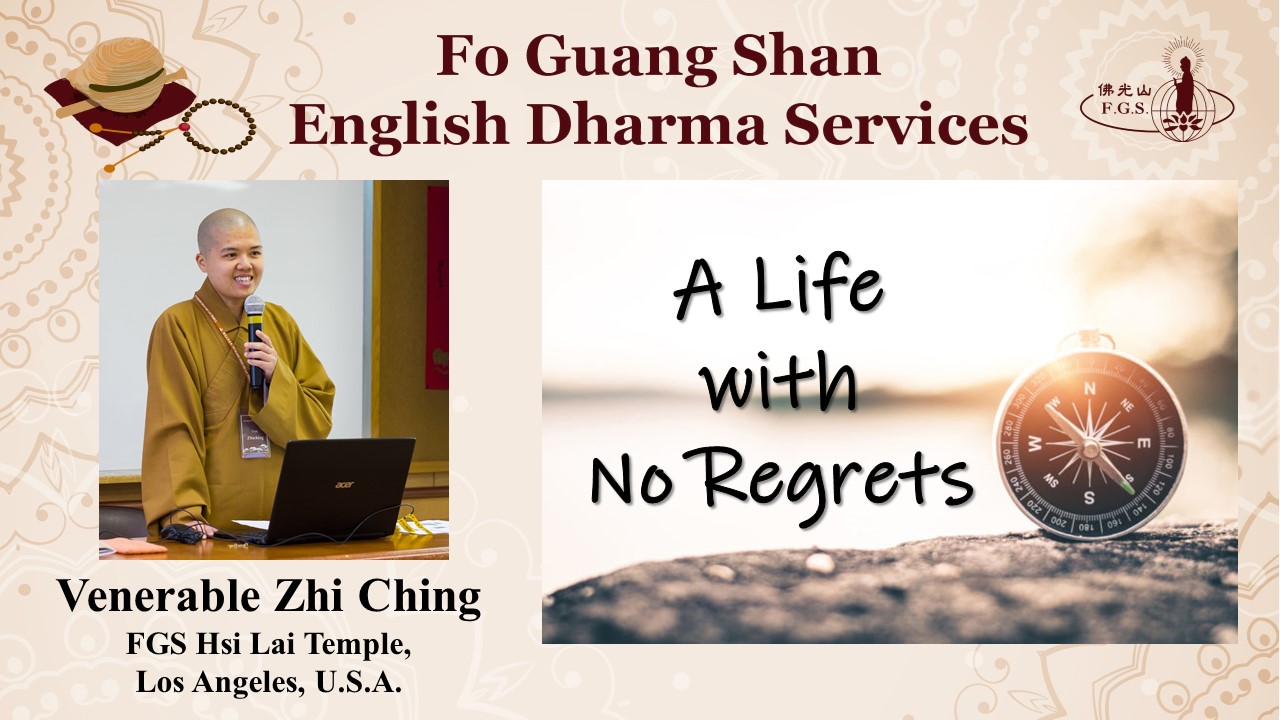
Speaker: Ven. Zhi Ching
Fo Guang Shan Hsi Lai Temple, Los Angeles, U.S.A.
I. Introduction
Hello everyone, thank you for tuning in to Fo Guang Shan English Dharma Services. This is Venerable Zhi Ching from Fo Guang Shan Hsi Lai Temple.
Life and death are the two biggest existential questions. How should we deal with the challenges of life so that we will have no regrets when the time comes? Today, I would like to share with you a story about four brothers who believed they could escape death.
II. The Four Brothers Who Tried to Cheat Death
Once, there were four brothers who had supernatural powers. They could fly through the air, dive below the surface of the earth, move mountains and oceans, and even hold dominion over the sun and the moon.

Through their supernatural powers, they knew that they each only had seven days to live but they thought that, since there was nothing on earth that they could not do, they believed they could escape death.
Therefore, the first brother said, “I will dive into the sea and will not rise to the surface nor sink to the bottom. I will just dive and swim in between the two. This way, death will not be able to find me.”

The second brother said, “I will penetrate deep into Mt. Sumeru. This way death will not be able to find me.”

The third brother said, “I will hide in deep in the vastness of space. This way death will not be able to find me.”

The fourth brother said, “I will mingle in a big crowd in a big city. This way, death will catch someone else by mistake.”

Upon, finishing their discussion, the four brothers went to the king to bid him farewell, “Your Majesty, we only have seven days left on earth. We are each going to try to escape death and find a safe place to hide for the next seven days. After seven days have elapsed, we will come back to greet you again. While we are gone, we hope that you acquire merit by loving your people and protecting the country.”
After they departed each brother followed his plan to avoid death. Despite their plans, after seven days passed, all four brothers died, just as ripened fruit drops to the ground when its time has come.
When the king learned that one of the brothers was found dead in the street, he knew that the other three would fail to escape death as well.

The king approached the Buddha for advice, he said “In my country, there were four brothers whose supernatural powers were so incredible that they knew their lives were about to end. They even tried to escape impending death. Please tell me if such an escape is ever possible.”
The Buddha replied, “In life, there are four things that cannot be avoided: one will be born, one will grow old, one will be tortured by sickness, and eventually one will die. One cannot possibly escape death.” After listening to the Buddha’s advice, the king praised the Buddha, “Excellent, I understand your teachings. The four brothers’ attempted to use their supernatural powers to escape death could not succeed. All worldly success, fame and longevity are subject to change.”

III. A Life of No Regrets
Change is the only thing that does not change is this world. Flowers will blossom and wilt, the moon waxes and wanes, ocean tide rise and fall. How can we live a meaningful life knowing that change is always right around the corner?
Venerable Master Hsing Yun provides five ways for a meaningful life:
1. A Life of Learning
Life is always about growth. As children, we grow to be bigger and stronger. As we turn older, we receive education to increase our knowledge. After we graduate from school, our experiences in the workplace and in society mature us as a person. The learning process never stops. A life of learning brings a hopeful future.
2. A Life of Career
To provide for ourselves and our families, we strive to work hard in our chosen careers. We make plans for our lives and work and search for opportunities for success. A successful career is not limited to the workplace. Life is more meaningful if beneficial plans are made and actualize for the good of our family, society, and nation.
3. A Life of Service
A meaningful life is not limited to one’s success. Life becomes greater and broader because of service. Selfishness is a habitual tendency that we have, and our selfishness limit our attention to a limited few. On the other hand, if we choose to serve all people, then scope our hearts is widened.
4. A Life of Cultivation
Sometimes, you might feel lost in the hustle and bustle of life. This is when we turn inwards to our spiritual needs. A life of cultivation is a path of personal growth. Through spiritual cultivation, we can transcend from the mundane to the extraordinary.
5. A Life of Compassion
Some people live for themselves, some people live for their families, some live for their countries, and some live for the good of all people and the world. If we choose a life of compassion, we are striving for the good of all people and the world. With our compassionate vows, we are working towards peace and harmony in our society.
IV. When the Time Comes
The course of life may change all of a sudden. In these two years, the statistic and facts of the pandemic are published every day. As we reflect upon our own life and time in this world, how should we face death when it comes to us? When it comes to our family and friends?
Venerable Master Hsing Yun said “Face death without fear,” From the Buddhist perspective, life do not end with death. Life never really dies, rather, it exists in varied forms. Water becomes ice when placed in a freezer, pudding when mixed with flour, and clouds once it evaporates; yet, the essence of water never changes.
Expressed in modern terms, death is like immigration, where you simply move from one country to another. Of course, you need to be equipped with sufficient finances so you can afford a luxurious house in your new destination; if your capital is insufficient, then you could end up in a poor and deprived place.
Therefore, before we begin another round of birth and death, we need to prepare ourselves for this immigration by making sure that our provisions are plentiful.
For the deceased, the best way to pay tribute to them, is by holding a commemoration service to share their virtues and good deeds, or by establishing a scholarship or foundation in their name. This is similar to sending money to one’s families and friends who have immigrated to other places in order to assist them. For you, who are still breathing, you may follow a very simple rule: to establish good affinity with others as much as possible. Once these affinities are established, your future conditions will be optimal.
IV. Conclusion
Going back to the story in the beginning, the brothers chose to flee death to hold on to what they have gained in life. Life is a continuous succession just like a burning fire. Once a log is completely burned, the fire will not die out when another log is added. The fire of life continues though it may take another form. With this understanding, there will not be fear when the time comes. As Venerable Master said, “Face death without fear.” What matters is not the length of life—what matters is the meaning you have given to your life.
Thank you for joining us in this Dharma service. Omitofo.

